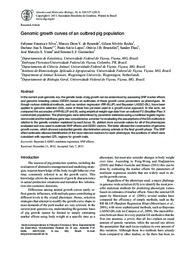Genomic growth curves of an outbred pig population.
Genomic growth curves of an outbred pig population.
Author(s): SILVA, F. F. e; RESENDE, M. D. V. de; ROCHA, G. S.; DUARTE, D. A. S.; LOPES, P. S.; BRUSTOLIN, O. J. B.; THUS, S.; VIANA, J. M. S.; GUIMARÃES, S. E. F.
Summary: In the current post-genomic era, the genetic basis of pig growth can be understood by assessing SNP marker effects and genomic breeding values (GEBV) based on estimates of these growth curve parameters as phenotypes. Although various statistical methods, such as random regression (RR-BLUP) and Bayesian LASSO (BL), have been applied to genomic selection (GS), none of these has yet been used in a growth curve approach. In this work, we compared the accuracies of RR-BLUP and BL using empirical weight-age data from an outbred F2 (Brazilian Piau X commercial) population. The phenotypes were determined by parameter estimates using a nonlinear logistic regression model and the halothane gene was considered as a marker for evaluating the assumptions of the GS methods in relation to the genetic variation explained by each locus. BL yielded more accurate values for all of the phenotypes evaluated and was used to estimate SNP effects and GEBV vectors. The latter allowed the construction of genomic growth curves, which showed substantial genetic discrimination among animals in the final growth phase. The SNP effect estimates allowed identification of the most relevant markers for each phenotype, the positions of which were coincident with reported QTL regions for growth traits.
Publication year: 2013
Types of publication: Journal article
Unit: Embrapa Forestry
Keywords: Curva de Crescimento, Melhoramento genético, Porco
Observation
Some of Embrapa's publications are published as ePub files. To read them, use or download one of the following free software options to your computer or mobile device. Android: Google Play Books; IOS: iBooks; Windows and Linux: Calibre.
Access other publications
Access the Agricultural Research Database (BDPA) to consult Embrapa's full library collection and records.
Visit Embrapa Bookstore to purchase books and other publications sold by Embrapa.

